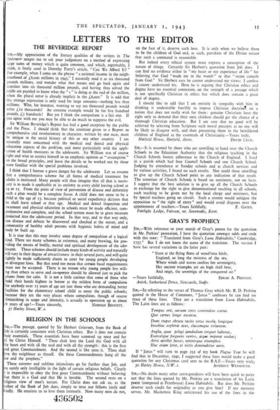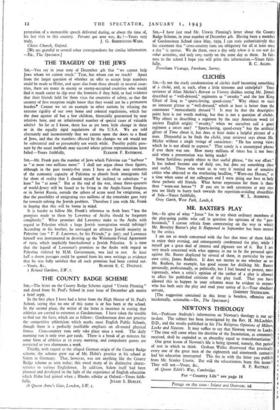GRAY'S PROPHECY Snt,—With reference to your search of Gray's poems
for the quotation in Mr. Perkins' peroration, I have the quotation amongst odds and ends with this note: "Translated from Gray's Luna Habitabilis," Cambridge, 1737." But I do not know the name of the translator. The version I have has several variations in the latter part:
"Stare at the flying fleets of wond'rous birds. England, so long the mistress of the sea, Where winds and waves confess her sovereignty, Her ancient triumphs yet on high shall bear, And reign, the sovereign of the conquered air."
—Yours faithfully, EDGAR A. PRESTON.
Anlok, Sutherland Drive, Newcastle, Staffs.
Snt,—In referring to the verses of Thomas Gray which Mr. R. D. Perkins quoted in the House of Commons, " Janus " confesses he can find no trace of these lines. They are a translation from Luna Habitabilis. The Latin lines are as follows:
Tern pus erit, sursum totos contendere coetus Quo cernes longo excursu.
Dum stu pet obtutu tacito vetus i,wola, longeque Insolitas explorat ayes, classemque volantem.
Anglia, quae pelagi jamdudum torque! habenas, Exercetque frequent ventos, ague imperat undaeg Airis atiollet fasces, veteresque triumphos Hue etiam fete!, et victis dominabitur auris.
If " Janus " will turn to page 232 of my book Plague Year he will find that in December, 1940, I suggested these lines would make a good quotation for any Christmas card sent to the R.A.F.—Yours very truly, 30 Harley House, N.W. z. ANTHONY WEYMOUTH.
SIR,—NO doubt many other correspondents will have been quick to point out that the lines quoted by Mr. Perkins are a translation of his Latin poem (composed at Peterhouse) Luna Habitabilis. But does Mr. Perkins deserve such credit for originality as you give him? If my memory serves, Mr. Mackenzie King anticipated his use of the lines in the
peroration of a memorable speech delivered during, or about the time of, his last visit to this country. Persant qui ante nos, &c.!—Yours very
truly, J. G. BARRINGTON-WARD. Christ Church, Oxford.
[We are grateful to several other correspondents for similar information.
— Eo., The Spectator.]























 Previous page
Previous page